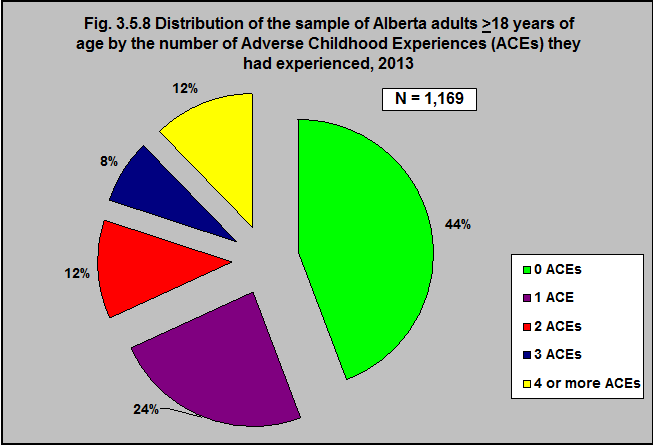Distribution of the sample of Alberta adults ≥18 years of age by the number of Adverse Childhood Experiences (ACEs) they had experienced, 2013

Notes:
Questions were answered by adults ≥18 years of age about their experiences before the age of 18
Source: CICH Table using data adapted from Alberta Adverse Childhood Experiences Survey, 2013. http://www.mtroyal.ca/cs/groups/public/documents/pdf/rvpc_gp_finalreport_ace.pdf -accessed June 26,
2017.
An Adverse Childhood Experiences (ACE) checklist has been used in numerous studies to collect sensitive information on types of childhood trauma: physical abuse, sexual abuse, alcoholic or drug addict parent, family member in jail, battered mother, parent with mental illness, loss of a parent, physical neglect, emotional neglect, or verbal/emotional abuse. These studies have consistently found an association between ACEs and adult chronic disease.
In 2013, the Alberta Adverse Childhood Experiences Study modified the ACE Checklist so that it was appropriate for interviewing people about sensitive issues over the telephone. A survey was conducted among 1,169 Alberta adults ≥ 18 years of age. They asked 8 questions about two main areas of childhood trauma: childhood abuse and growing up in a household where there was family dysfunction.
Fifty-six percent of the adults surveyed had experienced as least one ACE before the age of 18. About half of these, 24% had experienced one ACE. 12% had experienced 4 or more.
Before the age of 18, 27.2% had experienced abuse and 49.1% had experienced family dysfunction.1
ACEs rarely occur in isolation. Having one ACE increases the probability of experiencing another one by 84%.1
Children who experienced more ACEs were more likely to be diagnosed with mental health conditions or substance dependence in adulthood.1
Children who experienced more ACEs were more likely to perceive their physical health, emotional health, and social support as poor.1
1Alberta Adverse Childhood Experiences Survey, 2013. http://www.mtroyal.ca/cs/groups/public/documents/pdf/rvpc_gp_finalreport_ace.pdf-accessed June 26,
2017.
Implications
Evidence indicates that children who suffer trauma, such as abuse, neglect, living in a home where there is violence, or having a parent who is mentally ill have twice the risk of conditions like obesity, cardiovascular disease, addiction, and depression as adults.
The results demonstrated that adverse childhood experiences (ACEs) were common and there were strong associations between childhood trauma and increased risk for poor health outcomes in adulthood.
Prevention strategies include effective programs and interventions to stop child exposure to toxic stress such as home visitation programs*, and delivery of evidence-based parenting interventions such as Healthy Start initiatives**. A commitment to social change is also needed to foster safe environments that support nurturing and stable relationships for children and families.1
*Examples of trauma and abuse prevention programs include Nurse-Family Partnership, Nurturing Parenting, and Positive Discipline Program
**Examples include Hawaii Health Start, Sure Start, Healthy Beginnings
